International conference organized by the Kassák Museum in Budapest, with the support of Visegrad Fund (Small Grant) and CEFRES.
 Partners : Charles University in Prague, Jagiellonian University in Cracow, Adam Mickiewicz University, University of Warsaw, Masaryk University in Brno, Academy of Sciences of the Czech Republic, Polish Academy of Sciences, Slovak Academy of Sciences, National Museum in Warsaw, Slovak Design Museum and Monoskop.org.
Partners : Charles University in Prague, Jagiellonian University in Cracow, Adam Mickiewicz University, University of Warsaw, Masaryk University in Brno, Academy of Sciences of the Czech Republic, Polish Academy of Sciences, Slovak Academy of Sciences, National Museum in Warsaw, Slovak Design Museum and Monoskop.org.
See the complete program here.
Check on Kassák Museum webpage here.
The subject of the conference is the ‘Central European avant-garde magazine’, arguably the most important medium of communication for progressive literature and visual arts in the region during and after the First World War. Given the multifaceted nature of the phenomenon, the analysis will take an interdisciplinary perspective and employ several different approaches. The avant-garde magazine will be examined as a discursive space of avant-garde communication, as a Gesamtkunstwerk, and as a historical document. As the recent conjuncture in scholarship positions the art of the region in the international context, our aim is to draw more attention to the – sometimes ambivalent – interrelationships between the local contexts and international networks of Central European avant-gardes.
How did the different cultural and historical characteristics affect the ‘local’ avant-gardes of Central Europe? How are the avant-garde magazines of Central Europe related to each other? Accordingly, how could ‘Central European avant-gardes’ be described from the perspectives of Cracow, Warsaw, Prague, Bratislava or Budapest? Through detailed case studies, the conference will emphasize the complex and problematic nature of Central European avant-garde magazines regarding the questions of national/local and international/cosmopolitan. The conference will include monographic, thematic and problem-oriented lectures on current research on local avant-garde magazines published during the First World War and in the interwar period.
The conference is accompanied by a temporary exhibition in the Kassák Museum dedicated to the first avant-garde magazine of Lajos Kassák, A Tett [The Act] published between 1915 and 1916. The exhibition marks the centenary of Kassák’s ‘debut’. The Kassák Museum is the only thematic showroom of the historical avant-garde in Hungary. Its objectives in this regard are to reach a broader audience and to establish the museum as a regional focus point for research into the avant-garde and modernism.
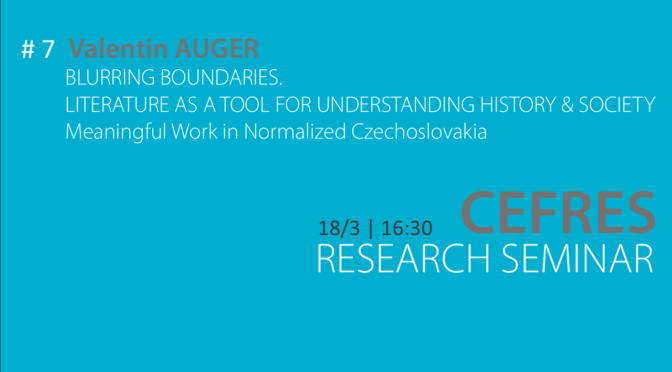
Blurring Boundaries: Literature as a Tool for
Understanding History and Society.
Meaningful work during normalized Czechoslovakia
7th session of CEFRES in-house seminar
Through the presentation of works in progress, CEFRES’s Seminar aims at raising and discussing issues about methods, approaches or concepts, in a multidisciplinary spirit, allowing everyone to confront her or his own perspectives with the research presented.
Location: CEFRES Library and online (to get the link, write to cefres[@]cefres.cz)
Date: Tuesday, March 18, 2025 at 4:30 pm
Language: English
Valentin Auger (Faculty of Arts, Charles University, associated at CEFRES)
Chair: Jan Váňa (Institute of Czech Literature, Czech Academy of Sciences)
Abstract Continue reading Literature as a Tool for Understanding History and Society →
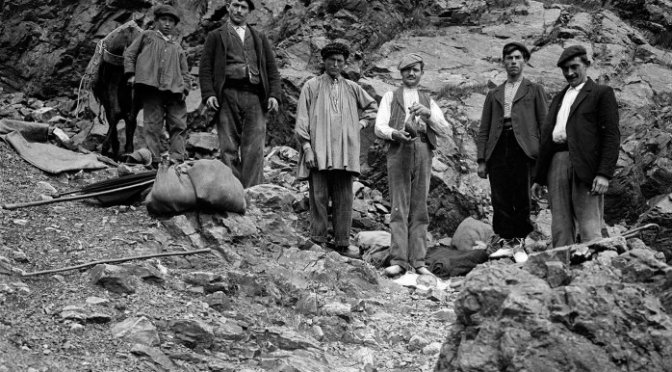
Lecture by Laure Teulières on “Foreigners from Here: Migrants and Migrations in France through Films from Toulouse Cinematheque
When: Wednesday 26 April, 6:30-8 pm
Venue: French Institute in Prague (5th floor), Štěpánská 35, Prague 1
Language: French
An invitation to review a part of the history of immigration in France through a commented screening. The Toulouse Cinematheque, one of the main film archives in France, has led innovative research on migrants and migrations thanks to its collections. “Foreigners from Here” (as a book and as a program) is a way to share our findings with the public. Rather than quoting excerpts of famous films, the lecture will highlight rarely screened documents: some fiction, others news reports, institutional or activist fims, as well as family films.
Check Laure Teulières’s program in Warsaw and Prague in the frame of CEFRES Visegrad Forum on our calendar.
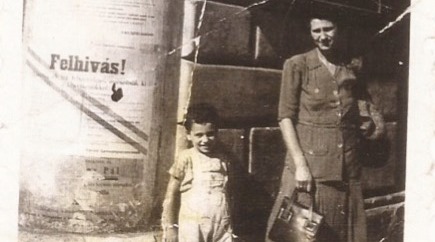
A lecture by Éva Kovacs (Vienna Wiesenthal Institute for Holocaust Studies) in the frame of the seminar on Modern Jewish History of the Institute of Contemporary History (AV ČR) and CEFRES in partnership with the Masaryk Institute (AV ČR).
Where: CEFRES library, Na Florenci 3, 110 00 Prague 1
When: from 5 pm to 6:30 pm
Language: English
In the past two decades, thanks to the opening of the digital collections in the United States, Israel, and Europe, the usage of oral history sources became attractive in historical research. These archives hold an enormous number of testimonies, which makes the research easier and faster, but, on the other hand, raises serious methodological questions. Meanwhile, the last survivors who can still give testimonies are passing away – the oral history sources are turning into „normal” archival sources soon. These new developments are challenging the history-writing on the Shoah.
Our case study deals with the everyday life of approximately 15 thousand Hungarian-Jewish deportees who were forced to work in Vienna and its vicinity in 1944-45. The presentation will focus on the Quellenkritik (source criticism) and methodology of using large oral history archives to explore insufficiently documented historical subjects.
Read more about the colloquia!
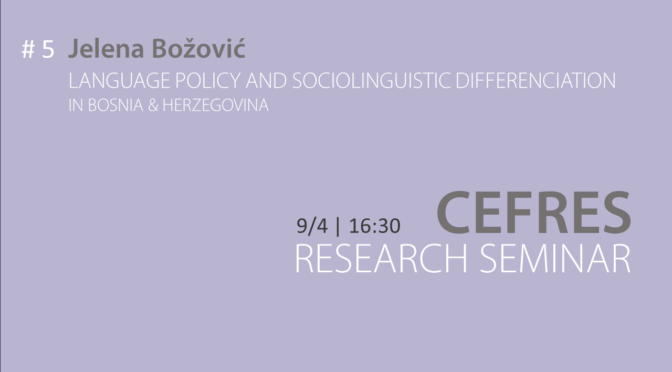
Language policy and sociolinguistic differentiation in Bosnia and Herzegovina: From (in)significant difference to language boundaries
5th session of CEFRES in-house seminar
Through the presentation of works in progress, CEFRES’s Seminar aims at raising and discussing issues about methods, approaches or concepts, in a multidisciplinary spirit, allowing everyone to confront her or his own perspectives with the research presented.
Location: CEFRES Library
Date: Tuesday, April 9, 2024 at 4:30 pm
Language: English
Contact / To register: cefres[@]cefres.cz
Speaker
- Markéta Slavková, The Prague Security Studies Institute
Abstract
The question of language boundaries is not often addressed in language policy studies. When exploring multilingual settings, language policy scholars traditionally presuppose a plurality of languages treated as separate and fixed bounded entities. Working with easily identifiable and distinguishable linguistic units then allows for a closer study of their relationships. However, this task can be challenging in settings where languages are structurally close and overlapping, and boundaries are not always sharp and clear-cut. Here, determining the relationships between the (competing) languages and linguistic groups is not necessarily straightforward. This is because some differences are more subjected to boundary processes and some less, while some go completely unnoticed. Insights from these settings can therefore expand our understanding of language boundaries as stemming not only or not always from differences in languages’ formal aspects and their denotational, usually stable, meanings, but also as something deriving from the social and political function of language and its situated use.
In my dissertation, I am focused on Bosnia and Herzegovina, a context where a transition from one common standard language to three separate national standard languages occurred following the disintegration of Yugoslavia, inevitably raising the question of differentiation and boundaries. In fact, while examining the processes of interpretation of the official language policies during my ethnographic fieldwork in this country, it became clear that they mostly consist in interpreting differences and boundaries between these languages. Thus, my research is concentrated on language boundary processes, i.e. on how language boundaries are constructed, deconstructed, blurred, transcended or ignored altogether by social actors within various language policy settings. In this seminar, I will focus on questions of which boundaries are constructed and how, and in what ways these processes are related to questions of power relations and authority as well as their implications for the official language policy.
See the complete program of 2023–2024 seminar here.

Landscapes with Shadows. Presentation of Luba Jurgenson’s research project
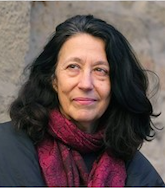
In June, July and August 2022, the researcher, writer and translator Luba Jurgenson, professor at Sorbonne University and director of Eur’ORBEM, will be at CEFRES as a guest researcher. For further information, click here to see her CV.
When: Thursday, June 30th, 10:30 – 12:00 a.m.
Where: CEFRES Library, Na Florenci 3, Prague & also “online” – link to ZOOM meeting on request (cefres@cefres.cz)
Language: English
Continue reading Landscapes with Shadows →
 Partners : Charles University in Prague, Jagiellonian University in Cracow, Adam Mickiewicz University, University of Warsaw, Masaryk University in Brno, Academy of Sciences of the Czech Republic, Polish Academy of Sciences, Slovak Academy of Sciences, National Museum in Warsaw, Slovak Design Museum and Monoskop.org.
Partners : Charles University in Prague, Jagiellonian University in Cracow, Adam Mickiewicz University, University of Warsaw, Masaryk University in Brno, Academy of Sciences of the Czech Republic, Polish Academy of Sciences, Slovak Academy of Sciences, National Museum in Warsaw, Slovak Design Museum and Monoskop.org.





